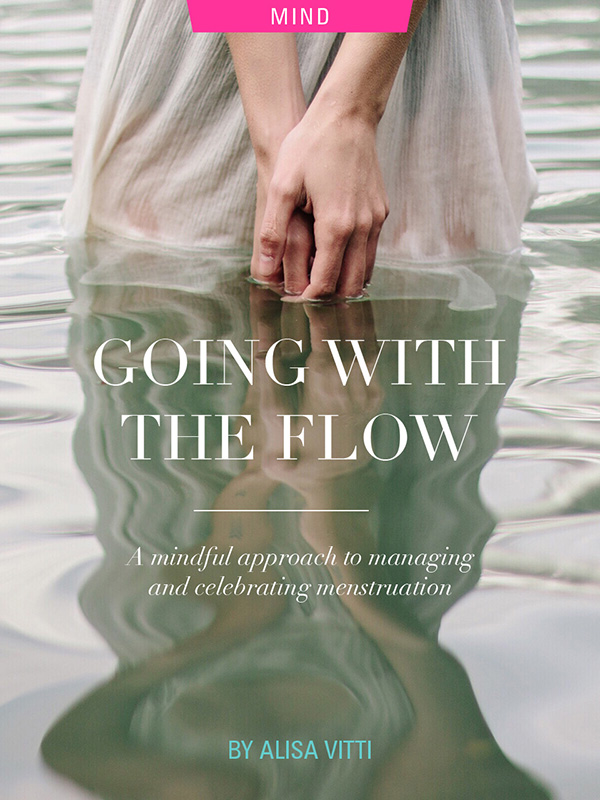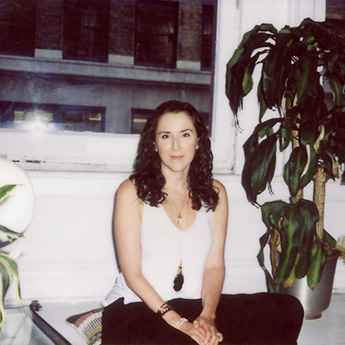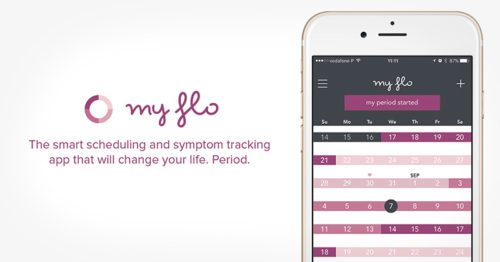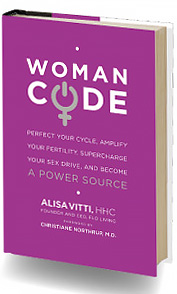
Mindful methods to manage menstrual cycles and help mitigate PMS, while celebrating a woman’s unique hormonal composition
—
Here’s an enlightening experiment: text your five closest girlfriends and ask them if they’ve ever had a painful/heavy/too frequent/absent period. If you’re met with awkward silence or sheepish non-answers, follow up and ask if they’ve ever experienced irritability, headaches, moodiness, or other majorly inconvenient or even painful symptoms and simply chalked the issue up to “hormones.”
If you’re flooded with affirmative replies, you’ve successfully confirmed what science already knows: a staggering number of women suffer from menstrual symptoms. Thanks to pop culture stereotypes, you’re probably used to exaggerated rom-com representations of one specific issue: PMS. Premenstrual syndrome, or PMS, is usually characterized as an avalanche of symptoms including depression, moodiness, abdominal pain, breast tenderness, headache, and fatigue during a woman’s luteal phase (just before her period). Up to 85 percent of menstruating women report having one or more premenstrual symptoms, and 2 to 10 percent report disabling, incapacitating symptoms.
The syndrome is so commonly acknowledged and accepted as a normal consequence of femaleness that corporations have built big business on it: diuretics and nonsteroidal anti-inflammatory drugs (NSAIDs) are considered run-of-the-mill treatments, and in extreme cases, doctors may prescribe antidepressants to blunt serious mood swings. Celebrities are in on the industry too: Whoopi Goldberg even recently released her own line of medical cannabis for “menstrual relief.”
But PMS isn’t the only type of hormonal upheaval striking women.
Menorrhagia (heavy periods) affects 30% of reproductive age women, and dysmenorrhea (painful periods) affect up to 50%. Other women deal with more complicated hormonal problems ranging from endometriosis to fibroids to Polycystic Ovary Syndrome (PCOS), a condition that affects between 4-12% of women.
I was one of these women diagnosed with PCOS. I was a 20-year-old student at Johns Hopkins University when — after years of battling unwanted weight gain, severe cystic acne, depression, and fatigue, my doctors finally diagnosed her. They told me my future would like include obesity, diabetes, heart disease, cancer, and infertility.

Conventional Western medicine doesn’t have much to offer when it comes to issues like mine. Women are typically given one of three options: medication (often in the form of synthetic birth control pills), surgery when applicable, or a list of vague lifestyle tips ranging from a “healthy diet” to “relaxation.” In my case, there was no treatment besides taking an under-researched cocktail of medications that might or might not help my symptoms, but wouldn’t cure me. I was disheartened, but determined to find another way. There had to be a natural solution. I refused to believe that my life would have to include mandatory unending tests, multiple prescription drugs, and a scary forecast for my future.
Menstruation itself has always been a taboo topic, but certain individuals and companies, and segments of the medical field — are starting to take the biological function (which occurs in half the population) mainstream: musician Kiran Gandhi famously ran the 2015 London Marathon without a pad or tampon while menstruating, artist Rupi Kaur posted an Instagram photo of herself with a stain on her pants and sheets, which was removed from the social network twice, and organizations like Distributing Dignity give menstrual hygiene products to women in need. Even the American Congress of Obstetricians and Gynecologists (ACOG) released a statement in 2016 officially declaring menstruation to be a vital sign. After my book, WomanCode, was published, I myself made TV, menstrual, and feminist history by being the first person to visually demonstrate simulated menstrual blood on national television as part of a segment I did for the Dr. Oz show back in 2013 helping women interpret the 5 different types of period colors they could see and what it meant for their hormones. I couldn’t believe fruit juice on white plates could have been so controversial! Just last year, I decided every woman should be able to audit her period color every month as a real time way to see how their hormones were doing and without it costing her anything. I launched a free tool to help women do just that online.
But while menstruation itself is slowly becoming part of the cultural dialogue, there hasn’t been much done to address what is effectively a chronic menstrual health care crisis. For women who struggle with daily pain and other problems, there’s been a lack of mainstream health management options beyond annual cervical health check-ups and breast exams.
I became aware of the void while dealing with my own menstrual issues, and I made it my mission to help other women.
After my PCOS diagnosis, I committed myself to researching and developing a nutritional and lifestyle protocol that would heal my condition. I successfully put into remission what my doctors had deemed an incurable illness, and I’ve been a practicing functional hormone expert and holistic nutritionist for the past 18 years. After over a decade of clinical practice, I decided there was a need in the market for a better solution, and opened The FLO Living Hormone Center.
The company’s mission is twofold: 1) To ensure women everywhere have universal access to modern menstrual health care that’s natural, effective, and actually affordable, and 2) To empower women to understand their hormones and know how to properly care and nourish themselves. And to end the cult of period misinformation that keeps women suffering needlessly and to end the toxic mythology that period problems are our destiny.
This last bit is critical to FLO Living’s mission: it’s not just about physical health; it’s about reclaiming the power of female physiology.
Think about how much negative energy each of us holds by virtue of this myth that our bodies betray us and that we’re victims. You hold on to that and the energetic residue brings you down. I want to hold up a mirror and tell women that none of it’s true. You can put symptoms and conditions into remission. It’s cathartic; every time I talk to a woman, I can see her reclaiming a sense of pride in who she is because she is a woman.
Since establishing The FLO Living Hormone Center as the first and only global hormonal/menstrual/fertility online health care center five years ago, I’ve amassed tens of thousands of clients in every major country worldwide. My book, WomanCode, a best-seller, has been in print for four years and is among the top 20 best-selling women’s health books of all time. It describes my five-step FLO protocol that gives women with PMS, PCOS, fibroids, endometriosis, ovarian cysts, dysmenorrhea, amenorrhea, infertility, and perimenopause the ultimate plan for restoring their health and eliminating symptoms.
In many ways, my personal and professional success is a timely, radical response to Western medicine’s conventional care model.
But, perhaps even more progressively, it offers affordable care to women. While the personalized approach is often touted as a more evolved and patient-empowering methodology, the tests and treatments commonly come with a hefty price tag, and conditions often require long-term care and maintenance. Often, women don’t seek out care due to the significant upfront practice gateway costs. Millions and millions of women struggle with fibroids, PCOS, endometriosis, and PMS in silence and isolation, and aren’t given sufficient medical care and don’t have a trusted place to go, which is why my work with FLO Living is integral in leading the way in education and service.
While food and lifestyle changes are often prescribed to women suffering from hormonal conditions, conventional methods and dietary theories fail to address the changing cyclical needs of women’s unique biochemistry. Most dietary theory is predicated on a foundation of the 24-hour male hormonal circadian pattern. In order for women to maintain good hormonal health, they need to base their self care on their own 28 day hormonal circadian pattern and choose foods, exercises, and activities that align with their hormones and optimize them for peak productivity and flow.
There are two kinds of time. Chronological time is the conventional 24-hour paradigm. Kairos time refers to the idea that things have to have a certain pacing in order to come to fruition. This aligns with the four phases of the cycle, and it’s applicable whether you’re talking about creating a tiny human or nurturing an idea. Bringing anything into existence requires specific timing and pacing, and by letting your body keep the pace for you, you’ll have access to doing things more efficiently and also experiencing success and pleasure.

This is what prompted me to finally launch the smartphone app so many fans of my book had been requesting for years. Earlier this year, I unveiled the MyFLO Period Tracker, an app that not only allows users to track menstrual symptoms, but offers direct, actionable solutions to eliminate symptoms. With the launch of The MyFLO Period Tracking app, every woman is now easily able to hack her female neurohormone matrix and optimize her creativity, productivity, and success while reducing stress and symptoms. The app prompts you with the ideal activities to choose from at work, at the gym, and in the kitchen that optimize each week of the cycle and it gets scheduled right into your main calendar.
The technology is based on my concept of “cycle-syncing,” a pattern of eating and living in a way that optimizes the body’s natural hormonal fluctuations and sets women up for success in all areas. I’m not just interested in you being symptom-free — I want you to be your best self. I know what it’s like to feel trapped in my own body and now my body is my greatest asset. The app helps you maintain your hormone health through cycle syncing and feminine timing.
MyFLO is designed to adapt to users’ shifting patterns, providing more customized and tailored tips and suggestions the more it’s used.
In addition to symptom troubleshooting, it gives users insight into the best times of the month to capitalize on natural hormonal fluctuations to master business meetings, achieve fitness goals, and it even allows users to sync their cycles with their partners to ensure better orgasms. Much in line with ACOG’s opinion that menstruation is a vital sign of overall wellness, I believe female hormonal health impacts so much more than the body — it affects your entire outlook on life and your ability to achieve success.
My ultimate career path may not have been entirely surprising to my elementary school classmates; in 6th grade, I started the period club with her three best friends, a support group of sorts for the prepubescent girls who who were much more fascinated by the prospect of their future female functions than their peers.
My experience of being so awestruck by my period and so excited about it and so looking forward to it and so welcoming of this change in my body — you could say that that’s not a typical response. The majority of us have an interesting relationship with our period and I don’t necessarily think it’s your own design that you end up having this negative idea about yourself.
In my TED talk, I pointed to a quote from Gloria Steinem:
“Girls are taught to view their bodies as unending projects to work on, whereas boys from a young age, are taught to view their bodies as tools to master their environment.”
Women internalize this message at a very young age; at or before the time of their first periods and are taught to distance themselves from the realities of life in a female body. This leaves them vulnerable to the temptation to medicate menstruation and all of its accompanying issues away.
Imagine if you were told instead that every single reproductive fluid your body produces is life-giving — which it is! — you may have thought about your body in a different way. Menstrual blood is the richest source of stem cells second to cord blood. Breast milk is a huge distribution of immune factors. A baby’s saliva enters nipple and programs the mammary glands to produce just the right immune factors. Your vaginal secretions contain the primal bacterial seeds for all human microbiome health.
Today’s women have an opportunity to choose what they believe, and that freedom of thought is what led me to launch my company. It’s no small coincidence that when women regain control of their health and their hormones, it opens the floodgates of creativity to allow them to become powerful change agents. Many women graduate from the MonthlyFLO program and change careers or make a major life shift. By virtue of going through this process, you come away reoriented and no longer believe the myths you’ve been told and you can really start proactively creating more of the things you want in your life. That’s really exciting.
You may also enjoy reading Interview: Regena Thomashauer | The Power of Pleasure & Reclaiming Radiance with Kristen Noel
